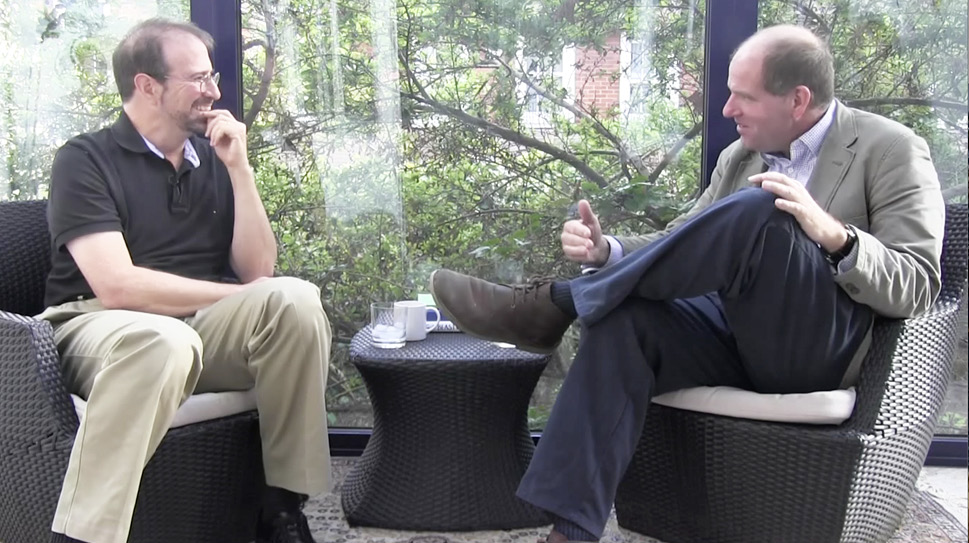The contents of this book are based upon a filmed conversation between Howard Burton and Charles Foster in London, England, on October 5, 2016.
Introduction
At the Heart
It took a fair amount of studied reflection to get the right sense of where, precisely, to place Charles Foster in the Ideas Roadshow universe. He holds a position on the law faculty at the University of Oxford and has written many legal books and articles on medical law. And yet he didnt seem quite right to be included in our Law collection.
He is a fervent environmentalist who wrote the New York Times Bestseller Being a Beast, captivatingly relating his pioneering experiences of temporarily living like a badger, otter, fox, deer and swift in a quixotic attempt to cross the human-animal divide. And yet he didnt fit our collection on The Environment either.
He is a Fellow of the Royal Geographical Society and Linnean Society, who has penned travelogues of numerous exotic locales and their societies, but it struck me as a decided stretch to put him in our Anthropology & Sociology collection.
Eventually, I opted to officially place him in one of our two Philosophy collections, despite the fact that he is not, by and large, officially regarded as a philosopher. But that, to my mind, is where he belongs: not so much because he is an unquestionably erudite fellow who can appropriately throw words like ontological and epistemological around with ease while penetratingly invoking key intellectual precedents from the likes of Aristotle and Aquinas, nor even because he is an acknowledged authority on medical and biological ethics, a universally-recognized domain of contemporary professional philosophy, but simply because it is unequivocally clear to me that Charles Foster simply thinks like a philosopher.
How else but a philosopher, I ask, would you appropriately describe someone who says something like this:
When I go into a wood I dont see a tree, except for a fraction of a second. And when I start describing that tree to myself, what Im describing is Charles Fosters thoughts about the tree; and thats disastrous for a number reasons. If I want to know what that tree is actually like, I need to do better than that. If I need to relate to that tree, which presupposes that I know something accurately about it, I need to do better than that.
So it seems to me that we are in an epistemological crisis, and that lots of our neuroses boil down to the fact that we dont know enough about this world that we mooch through. And therefore we cant expect to feel at home in itwe cant expect to have our ethical attitudes towards the world calibrated remotely right.
We need to know more about everything in order to know where we are in relation to everything else; and therefore what should determine the ethics of our relationship to everything.
Many people, of course, like to invoke the importance of relationships. It is the sort of vague, touchy-feely word that has a tendency to send sceptical people like me running headlong for the hills to avoid its many overconfident champions who inevitably feel inclined to follow-up their public avowals of the merits of relating with woolly pronouncements on how everything is connected.
But Charles isnt like that. At all.
Its not that he shies away from adopting a significant number of decidedly eyebrow-raising views. He certainly doesnt. From the universe seems to be set up in such a way that it facilitates the ability of the organisms within it to have a communion with one another, to in order to know something, we have, Platonically, to undertake anamnesis, unforgetting; and children can help us to unforget things, not to mention a willingness to spend days of his life literally digging into the earth in a quest to establish some form of direct connection with other members of the animal world, its safe to say that the world of Charles Foster is riddled with a good many perspectives that most of us, myself definitely included, would unhesitatingly label as significantly out there.
He is certainly provocative. And iconoclastic. But he is not the slightest bit flaky. Which means that when Charles talks about the ethical implications of his theory of relationship, his ideas demand to be taken seriously.
For me, relationship is absolutely everything. We cant begin to thrive unless we have good relationships with ourselves, with our human and nonhuman compatriots. If you try to say who Charles Foster is, you have to do that by defining him in terms of the nexus of relationships in which he exists. To take away my relationships I dont just become a miserable, wretched, lonely creature, I actually evaporate: I cease to exist.
So to the question, What is Charles Foster? the correct answer is that he is the nexus of relationships in which he exists. And in order to understand my relationships and say where I am in the nexus, I have to first of all have an idea of who I am; and secondly, who the other things in that nexus are and how they are related to me and to each other. Thats where it all comes from.
And since we relatenot just to ourselves and not just as humans, but also to everything elsethat imposes a pretty crushing burden of inquiry on anyone who wants to feel at home in the world, who wants to do the right thing in the world.
That was the quest which drew Aristotle to be a passionate, natural historian; and I guess thats also why my butterfly mind has fluttered happily over the flowers over which it has.
Philosophy, then. It simply has to be.
The Conversation

I. An Aristotelian Encounter
A mystery solved
HB: Theres an interesting story connected to your case that Id like to relate to you and then eventually, hopefully, come to a questionI sometimes have difficulties in coming to a question and this time I suspect will be even harder than most, but Ill try; hang in there.
So heres my story. Im thinking about the next seasons filming for Ideas Roadshow, and I say to myself, We should really beef up our law section; I should talk to some people who are expert in the law.









